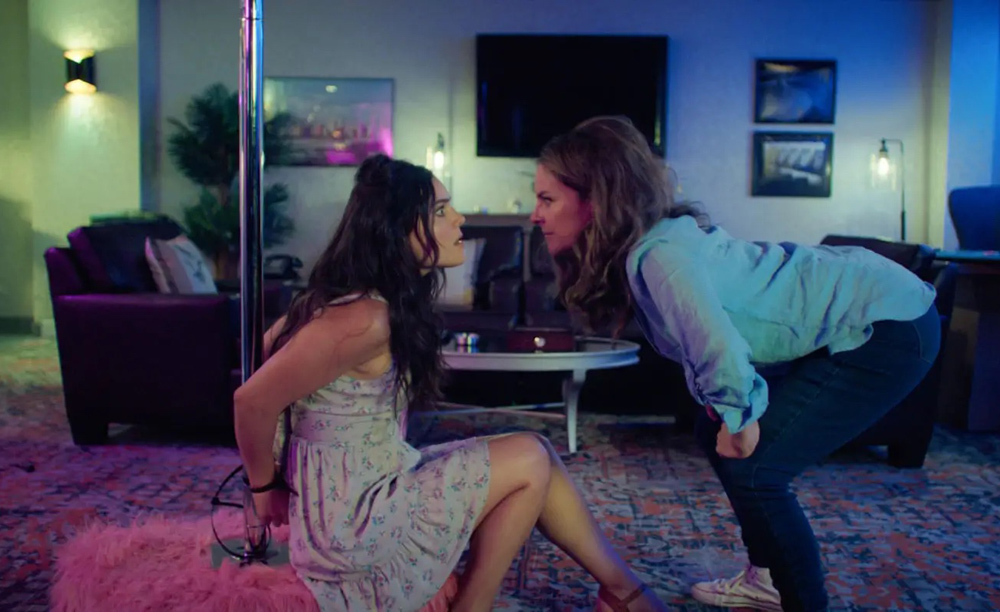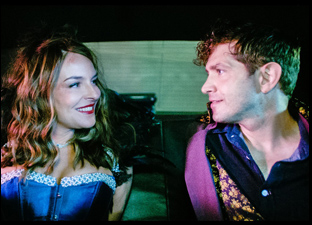If there’s a feeling that both writer/director Nicole Gomez Fisher and an audience can share after “Good Egg,” it’s that it was worth the wait. After making a splashy debut feature with the wild comedy “Sleeping with the Fishes” that saw Gina Rodriguez receiving no help from her boisterous multicultural family as she looked for an identity of her own in the wake of her husband’s death, the director’s follow-up was nearly a decade in the making and required not only Gomez Fisher to invest time and energy, but so much of her personal experience as she attempted to become a mother, ending up with two bundles of joy, one of which she can share with audiences far and wide now.
As difficult a period as it was for the filmmaker trying to conceive, Gomez Fisher has turned her trials into a rich and funny action comedy about a high school theater teacher named Jessica (Yara Martinez) who has more than enough drama at home and she and her husband Gordon have been dutifully undergoing IVF sessions, though Jessica’s inability to get pregnant has made her see her own life as if she was “an understudy in a hit Broadway show.” Staging “Rosemary’s Baby: The Musical” at school, she steps into something more potentially horrific when she tries to rescue a stranger named Bridget (Andrea Londo) from being harassed on the street and the good deed doesn’t go unpunished when Bridget offers herself up to be an egg donor upon learning that Jessica needs one. However, the kind gesture comes with plenty of baggage attached when those thugs that were harassing Bridget continue to chase her and Jessica ends up entangled in the same criminal underworld shenanigans that Bridget is, not to mention her husband Gordon (Joel Johnstone) who stumbles into a crypto scheme at his bank job.
The caper takes the trio from New York to Atlantic City, but the film runs an even greater emotional gamut as every outrageous laugh is accompanied by an equally deep insight about the surreal experience of partnerships potentially undone by what their bodies will allow for and the twists and turns of a process where there’s only so much of a common roadmap. Gomez Fisher doesn’t only contribute hard-won wisdom, but a verve that comes across in conversation with the vivacious filmmaker, perhaps watching her characters get in too deep, but never so dark that there isn’t a little purple and pink light around to brighten things up. After first premiering at last year’s Bentonville Film Festival, the film has been charming audiences on the festival circuit including a stop this week at Cinequest in San Jose before a broader release this fall and Gomez Fisher kindly spoke about how she was able to crack “Good Egg” as a narrative, working with the actors on a story so personal to her and the blessing of a creative outlet for an experience that brought a great deal of pain.
It’s funny. I sometimes don’t want to say it, but once again it’s loosely based on my life. [My husband and I] wanted to adopt, but the wait list for that was ridiculous, so after a lot of discussions, we went ahead with selecting an anonymous donor. And there was this one day my husband had to drop me off early at the fertility clinic when I accidentally bumped into our donor, which is not supposed to happen. I knew it was her because we are allowed to view a picture of them – if they chose to leave one – after your contract has been signed. I didn’t say anything to her, but this feeling of dread came over me of being not just broken, but empty and useless on some level. You’re pumped with hormones, so God knows what’s going through your brain, so I called my husband and said, “Baby mama is in front of me, what do I do?” And he’s like, “You’re going to sit still and you’re not going to move.” Of course, I didn’t listen. I was just dying to know who she was. I wanted to talk to her and to thank her. And while I was sitting there, I thought this is the wackiest thing in the world, because some people actually know their donors, some people don’t. And I just thought at that moment, “what if she wasn’t [who she said she was on the application]?”
People lie on college applications, why would they not lie on this? Who’s to say that she really has 10 brothers and seven aunts? The idea of choosing somebody and selecting somebody to — and I hate to say it this way — breed with your husband is a weird dynamic, and especially when you don’t get to know them. And a lot of these women do it because they need the money, and they’re young, and it helps them pay off their college loans or what have you. So I just started coming up with these crazy [story] ideas like, what if she wasn’t the person we thought she was? That’s where — and I am gonna say it — “Good Egg” was conceived. I went there.
You then had two beautiful births come out of this. And it’s a difficult situation that you find the light side of. Did this lend itself to a caper movie?
“Good Egg” became the light that pulled me out of my depression, and it was a love letter to my children in a very weird way. Like this is where mommy’s brain was when we were going through the process of trying to have a baby. And this script, honestly, saved me from going down a very dark hole. I was so depressed. I just couldn’t understand why me? And if one more person told me that God’s rejection was my protection, I was going to punch them in the face. So for me to try to make the situation humorous was maybe self-serving, but at the time I was just trying to get my head around the bizarreness of having two other women help me become a mother — the surrogate and the donor — and I just thought it would be really interesting to see a story less about the “baby” and more about a couple who have lost their way and have disconnected on so many levels and don’t see eye to eye, and what people will do when desperation kicks in.
It took me a long time to accept that this was our journey. I wanted to keep trying, but it’s so expensive, not to mention the emotional toll it takes. I purposefully wrote [the character of] Rebecca as a mother, a role played by Sharinna Allan, who happens to be so flippant about being a mother to show the dynamic between those who can easily have children versus those who can’t, to show the desperation that comes hand in hand with feeling broken. I don’t know if this film will resonate with a younger generation because when you talk about an action film, people are automatically thinking Tom Cruise and these big, huge movies, but in my mind, this film feels more of a throwback to late ’80s kind of movies like “Midnight Run” and “Outrageous Fortune,” those weird, wacky comedies, and with our budget, we spread our dollars as far as we could when it came to special effects, not to mention we shot during COVID, and that takes a huge chunk of your budget right there.
You get your hands on a really fascinating car to cross state lines. What was it like getting that flashy yellow car?
I just wanted a sporty, bizarre car that you wouldn’t necessarily see sitting around Brooklyn, and I told [our transportation captain], “This [character] is a locksmith, so this is more of a fixer-upper kind of car,” and I wanted something bright and fun because in the beginning, the color is intentionally dimmer and then as we go, it gets brighter and brighter. I wanted that contrast of the character’s journey to be present from the intro of the yellow car to the end when our color palette gets brighter, as does the main character’s journey. That car to me was a character in and of itself. Miggy, played by Haas Manning, names it “Senorita Daisy” as a gesture of love to his girl. Originally, [that character] was written for a Latino but then Haas came in and I just loved the dynamic between him and Shary. “Senorita Daisy” is metaphorically like a child to them — that’s why he calls it “his baby,” [and I liked] the parallel between [Shary’s line] “…your baby’s in here…,” and him referring to the car as his.
You’ve got a fabulous cast in general. What sold you on Yara and Andrea?
Yara, I had not even met [before casting]. I had just seen a couple episodes of “Bull,” and she was in “Jane the Virgin” with Gina [Rodriguez, who was in “Sleeping with the Fishes”], and I wanted a Latina actress who just felt like they’ve been there, done that. It was really important to me that she understood the desire of wanting a baby, being married, the struggles of all that. I didn’t want an actress that hadn’t lived that world, who didn’t understand the fight or flight [mentality] of marriage and children. She really understood the character and Yara has a strength about her that combined with her comedic sensibility worked out really well.
Andrea was totally different. Initially as written, the character of Bridget was supposed to be a huge contrast to Jessica, but when I met Andrea, I thought, “She’s just so sweet, I don’t know if this is the right dynamic.” But the more I spoke to her and the more we talked about her character on a more intellectual level, she really understood Bridget and [this] parallel between wanting a child the way Yara’s character does, and then wanting to get her own child back. I love that dynamic. People were saying, “If you end up having somebody who looks terribly different than Yara, it’s not going to be believable.” But there is something to be said about people in my position, women and men, whether it’s sperm or egg donation, of wanting characteristics that resemble yours and who have some genetics or background that matches yours. Andrea is so subtle in her approach, but when you look at her closely, the edge is there just in a very subtle way, and I actually appreciated that versus somebody trying to push an image or an idea of a character.
When there is a basis of autobiography in there, even if it exists only as subtext, how much of that do you want to give to the actors versus wanting them to develop their own take on the character?
It’s about 50/50, maybe even less about me and more about their direction. When I work with my actors, I want them to have a sense of freedom that they can play and part of our conversation was, “Why did you write this, Nicole? Where is this coming from?” So I did share it with them and I thought it was important that they understood that although there’s levity to it, there is a lot of heart behind this woman and it was really important, with Yara especially, to have her understand the desperation, the journey, that feeling of being in a relationship for so many years that it begins to feel like you’re just coexisting.
But then I told them, “Go, find your character, find your moments and play” and [I’d step in if] if I didn’t think they’ were going in the right direction. I didn’t want it to come across is too slapstick. I didn’t want people to think I was mocking this whole world, because there was nothing funny about this journey for me. And really my intention when I wrote it and what I told Andrea and Yara was to bring a levity to a very dark situation. IVF is just shitty [as an experience]. It’s awful.
Was there anything really exciting that came of that?
I was actually pleasantly surprised by the performances because we didn’t have a lot of time for rehearsals. So I had no idea what the chemistry between the actors was going to be like, and that’s a scary thing as somebody who is helping finance, produce, direct, and write. You’re throwing these actors [into it] and you’re just putting all that trust into them in hopes that they’re going to land where you want them to be. But this cast, honestly, was like a family. On the day Priscilla [Lopez], who was also in “Fishes,” wrapped, we recorded her wrap speech, and all she talked about was how she hasn’t been on set with such a community where she felt like she was honestly just playing, like back in the day when acting was fun and it wasn’t about contracts and money. It was about just being an actor. That was something that was really important to me. Sometimes expecting the unexpected is a plus. And it really drives your script and your sense of story in a very different direction. I was actually very open to it on this one. I had no expectations other than, “Let’s go, action,” and see what happens.
“Good Egg” will screen at Cinequest Film Fest on August 23rd at Hammer Theatre Center at 9:15 pm and August 24th at the Mountain View ShowPlace ICON Theatre & Kitchen at 11:50 am.





